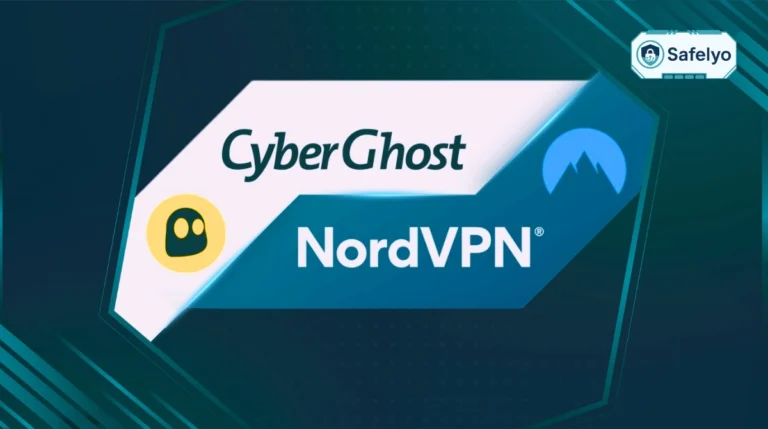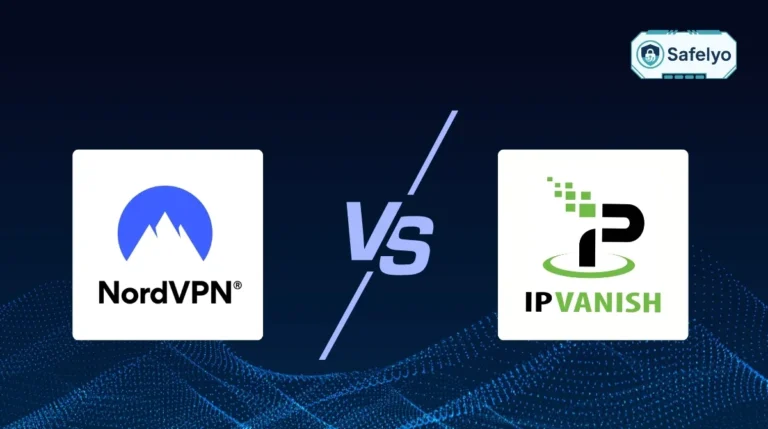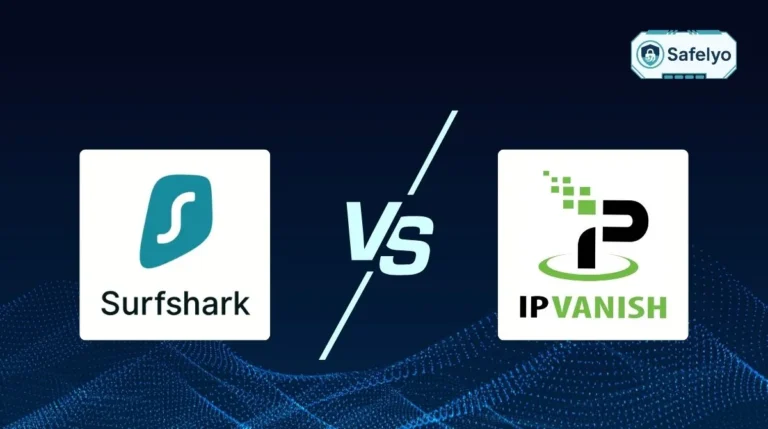When it comes to the free vs paid VPN comparison, there’s one tempting question on almost everyone’s mind: why pay for something you can supposedly get for free?
The allure of a ‘no-cost’ sticker is powerful. However, when a service is designed to protect your valuable data, it’s critical to ask the one question that matters: if you’re not paying with money, what’s the real price? Too often, the answer is your privacy and security.
As a cybersecurity analyst at Safelyo, I’ve spent years testing countless VPNs. I’ve seen firsthand how many ‘free’ services create a false sense of security, often using outdated protocols or, even worse, actively logging and selling user activity. It’s not just a theoretical risk; it’s a reality we’ve observed time and again.
In this detailed guide, you will discover:
- The real business model behind “free” VPNs.
- The critical security and performance risks you take with free services.
- Why a small monthly fee is a smart investment in your digital safety.
- How to choose the right type of VPN for your specific needs.
Don’t leave your digital safety to chance. Let me guide you through the facts, so you can make an informed decision that truly protects you online.
The short answer: Is a paid VPN worth it?
Yes, absolutely. For just a few dollars a month, a paid VPN offers critical security, privacy, and performance that free services simply cannot match. Most free VPNs come with a hidden cost: your personal data. Keep reading to understand the full picture and protect yourself.
1. Side-by-side: The ultimate free vs paid VPN comparison chart
To put it all into perspective, words can only go so far. Sometimes, a direct visual comparison makes the choice crystal clear. We’ve broken down the key differences between a typical free VPN and a standard paid VPN in this easy-to-read chart.
| Feature | Free VPNs (Typical) | Paid VPNs (Standard) |
| Business Model | Sells your data, shows ads | User subscription fees |
| Primary Goal | Monetize your activity | Protect your privacy |
| Logging Policy | Often logs and sells data | Strict, audited no-logs policy |
| Security | Weak or outdated encryption | AES-256 (Military-grade) |
| Kill Switch | Rarely included | Standard feature |
| Speed | Very slow, overcrowded servers | Fast, optimized for streaming |
| Data Limit | Capped (e.g., 500MB/month) | Unlimited |
| Server Network | Very few servers and locations | Thousands of servers globally |
| Streaming Access | Blocked by most services | Works with Netflix, etc. |
| P2P/Torrenting | Usually blocked or unsafe | Allowed and secured |
| Customer Support | None or email only | 24/7 Live Chat and Email |
| Malware/Ad Risk | High risk of both | Often includes blockers |
As the chart clearly shows, the two options are worlds apart. A free VPN often fails to deliver on the core promises of security, privacy, and freedom. In contrast, a paid VPN is built from the ground up to provide all three, making it a reliable tool rather than a risky gamble.
2. Core benefits that make a paid VPN the smart investment
After seeing the risks, it’s clear why a paid service isn’t a luxury – it’s a smart investment in your digital life. When you pay a provider, their business model aligns with your interests. Their goal is to keep you as a happy, secure customer, not to sell your data. Let’s break down the core benefits of a paid VPN.
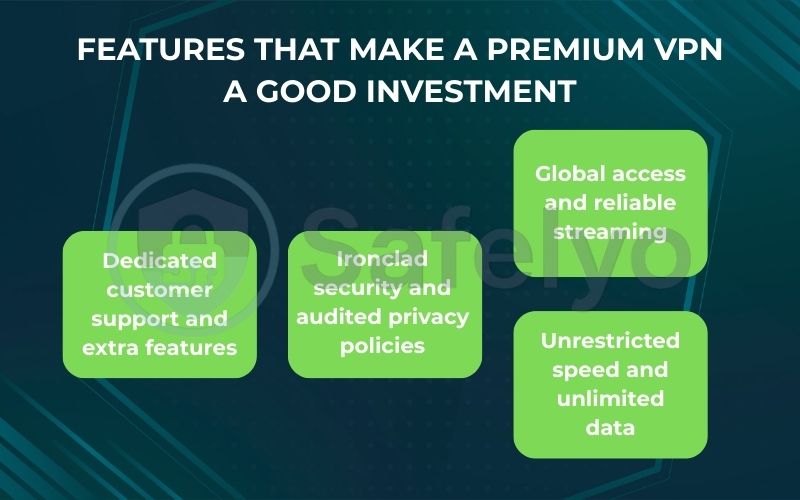
2.1. Ironclad security and audited privacy policies
This is the number one reason to upgrade. Reputable paid VPNs provide security you can actually trust. This includes:
- AES-256 encryption: This is the gold standard, the same level of encryption used by banks and militaries worldwide. It’s practically unbreakable, ensuring your data is always scrambled and unreadable to outsiders.
- Strict no-logs policies: Top providers promise not to track, store, or share your online activities. More importantly, they prove it. They hire independent firms like PwC or Deloitte to conduct rigorous audits of their systems to verify this promise.
- Essential safety features: An automatic Kill Switch comes standard, as does DNS leak protection, ensuring your real identity is never accidentally exposed.
A NOTE FROM OUR CYBERSECURITY ANALYST
At Safelyo, we only recommend paid VPNs with independently audited no-logs policies. This isn’t just a marketing claim; it’s a verifiable promise to protect your privacy. When I’m testing a service, this is one of the first things I check. An audit means the provider is willing to be held accountable, and that’s a cornerstone of trust.
2.2. Unrestricted speed and unlimited data
Remember the digital traffic jams on free VPNs? Paid services are the exact opposite. They are like having your own private, multi-lane expressway on the internet. Because they invest heavily in their server infrastructure and don’t overcrowd their network, you get:
- Blazing-fast speeds for a smooth, seamless browsing experience.
- Unlimited data and bandwidth, meaning you can stream movies in 4K, download large files in minutes, and play online games without frustrating lag or buffering.
I often have to download large software files for testing, sometimes over 50GB. On a free VPN, this could take all day. With my paid VPN, it’s done in under an hour. The difference is night and day.
2.3. Global access and reliable streaming
Paid VPNs unlock the internet. Instead of a handful of VPN servers, you get access to thousands of servers in hundreds of locations across the globe.
This means you can reliably bypass geo-restrictions and access content from anywhere. For example, if you’re traveling in Europe, you can connect to a US server and log into your home Netflix library to catch up on your favorite shows. With a paid VPN, it just works. They constantly update their servers to ensure they aren’t blocked by streaming platforms, a level of maintenance that free services can’t afford.
2.4. Dedicated customer support and extra features
Ever have a tech problem at 10 PM with no one to help? With a free VPN, you’re on your own. Paid providers offer professional 24/7 customer support, usually through live chat or email. If you have trouble connecting or setting up the VPN on a new device, a real person is there to help you in minutes.
You also get access to powerful extra features, such as:
- Split Tunneling: Lets you choose which apps or websites use the VPN and which connect directly to the internet. For example, I use it to secure my browser while letting my online game connect directly for the lowest ping.
- Double VPN (or MultiHop): Routes your traffic through two different VPN servers for an extra layer of encryption and anonymity.
- Built-in Ad and Malware Blockers: Many paid VPNs include tools that automatically block annoying ads and malicious websites, making your browsing faster and safer.
3. Ready to invest? Safelyo’s top 3 affordable paid VPN choices
Convinced that a paid VPN is the smart move? The great news is that top-tier protection doesn’t have to be expensive. Many of the best services on the market cost less than a cup of coffee per month. Here are three of Safelyo’s top-rated, affordable choices that offer an excellent balance of price, performance, and security.
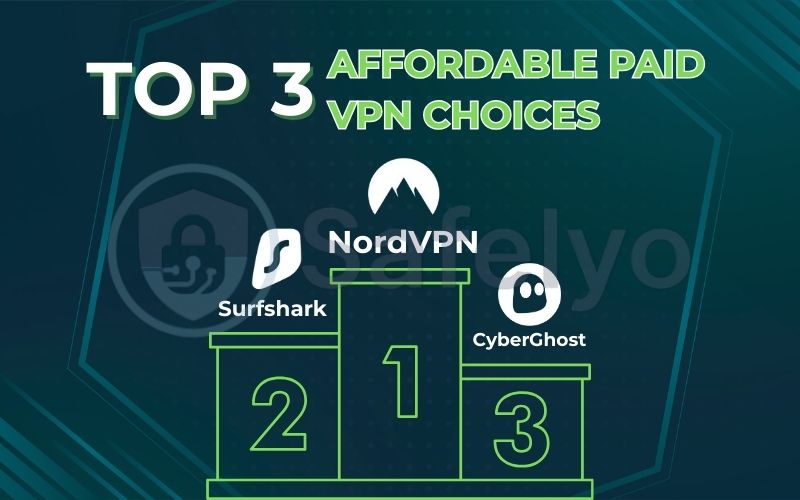
NordVPN
Starts from $3.19/month
Best for: Overall performance and unmatched security features.
A market leader for a reason, NordVPN delivers blazing-fast speeds, a massive server network, and powerful extras like Threat Protection.
>> Wondering if its features are right for you? Dive into our detailed analysis to see why NordVPN is our top pick.
Surfshark
Starts from $2.30/month
Best for: Unlimited devices and exceptional value.
Surfshark is our top pick for families or users with many gadgets. One subscription covers an unlimited number of simultaneous connections without sacrificing speed or security.
>> See how it stacks up against the competition and protects all your devices in our hands-on Surfshark review.
CyberGhost
Starts from $2.19/month
Best for: Beginners and streaming optimization.
With its incredibly user-friendly apps and servers optimized specifically for streaming services like Netflix and BBC iPlayer, CyberGhost makes it easy for anyone to get started.
>> Discover how easy it is to set up and unblock your favorite shows in our CyberGhost complete beginner’s guide.
4. How do free VPNs make money?
There’s a classic saying in the tech world that couldn’t be more true here: “If you’re not paying for the product, you ARE the product.” This is the single most important concept to grasp in the free vs paid VPN comparison.
Running a reliable VPN service is expensive. It requires maintaining a global network of high-speed servers, paying skilled engineers to develop and secure the software, and funding a customer support team. If a company isn’t charging you a subscription fee, they have to get that money from somewhere else.
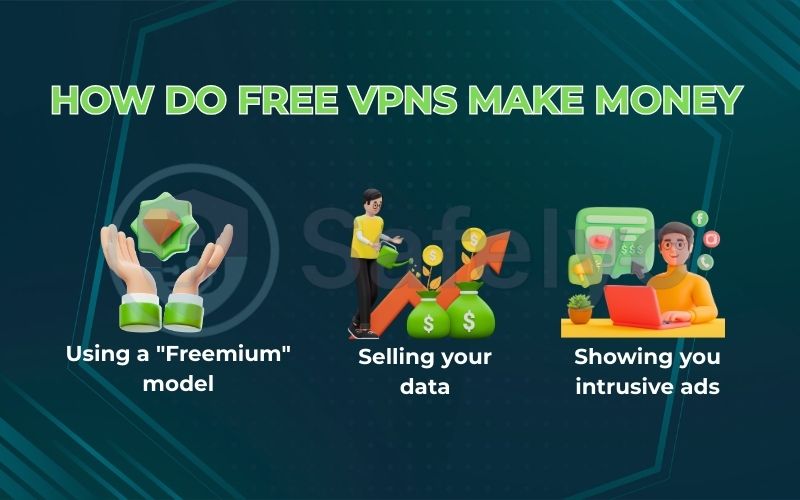
Based on my analysis of the VPN market, they typically do this in one of three ways:
- Selling your data. This is the most common and dangerous model. The VPN provider logs your online activity – the websites you visit, the products you search for, your approximate location – and then sells this valuable information to third parties. Think of data brokers and advertising companies that pay top dollar to know your habits. So, to answer the burning question, do free VPNs sell your data? For many, the answer is a resounding yes.
- Showing you intrusive ads. Some free VPNs operate like many free mobile apps: They bombard you with advertisements. This can range from annoying pop-ups within the app to injecting ad banners directly onto the websites you browse. Your peaceful browsing experience is sacrificed to generate revenue for them.
- Using a “Freemium” model. This is the most transparent approach. A reputable provider offers a very limited free version of their paid product. It’s like a free sample – it’s safe to use, but it comes with strict limits on speed, data, and server locations. Their goal is simple: To show you the value of their service so that you’ll eventually upgrade to a paid plan for the full experience.
In all my years of testing these services, I’ve settled on a simple analogy. Using a free VPN that sells your data is like hiring a bodyguard who gets paid by the very people you want protection from. Would you really trust them with your safety?
5. The real risks of using a free VPN
Now that we understand the business models, let’s unpack the direct consequences. The compromises free VPNs make to stay afloat translate into tangible risks and frustrations for you. These aren’t just minor inconveniences – they are fundamental flaws that defeat the very purpose of using a VPN.
5.1. Your privacy is the product: Data logging and weak security
This is the most critical risk. While you believe you’re protecting your privacy, many free providers actively log your every move. They record the websites you visit, how long you stay, and what you click on. This data is then packaged and sold.
Furthermore, their security infrastructure is often weak. They frequently use outdated, easily crackable encryption standards, leaving your data vulnerable to interception by hackers, especially on public Wi-Fi. Many also lack essential safety features like an automatic Kill Switch. A Kill Switch is a fail-safe that instantly cuts your internet connection if the VPN drops, preventing your real IP address and data from being accidentally exposed. Without it, you might not even realize you’ve become unprotected.
Safelyo’s Expert Take
Having tested over 50 VPN services, we’ve seen firsthand how many free VPNs use outdated encryption protocols. In one test on a popular free service, we were able to intercept unencrypted data packets in under 10 minutes using standard network sniffing tools. This is a risk you should never take with your personal information.
To make matters worse, there have been real-world scandals. The infamous Hola VPN case revealed that it was turning its users’ devices into a giant botnet, selling their bandwidth to other users without their consent. This is a stark reminder that a “free” service can cost you far more than money.
5.2. Poor performance: Slow speeds, data caps, and buffering
Have you ever tried using a free VPN only to find your internet slows to a crawl? This is by design. Free services cram thousands of users onto a small number of overcrowded servers. The result is a digital traffic jam.
You’ll experience:
- Painfully slow speeds that make simple browsing a chore.
- Constant buffering when you try to stream a video. Forget watching Netflix in HD; you’ll be lucky if it doesn’t freeze every 30 seconds.
- Strict data caps, often as low as 500MB per month. That’s barely enough to check your emails and read a few news articles, let alone stream or download files.
5.3. Limited functionality: Few server locations and blocked services
Paid VPNs boast thousands of servers across the globe. Free VPNs might offer a handful in a few countries. This severely limits your ability to bypass geo-restrictions.
Imagine wanting to watch US Netflix while traveling abroad, only to find the free VPN has no working US servers, or the few it has are already blocked. This is an incredibly common frustration. Streaming giants like Netflix, Hulu, and BBC iPlayer are experts at identifying and blacklisting the small pool of IP addresses used by free VPN providers, rendering them useless for entertainment.
5.4. Potential for malware and intrusive ads
The most dangerous free VPNs, particularly those found outside of official app stores, can be a Trojan horse for malware. Instead of protecting you, they infect your device with spyware, adware, or other malicious code.
Even if the app is “clean” of malware, you’ll likely face the constant annoyance of pop-up ads and banners, which we mentioned earlier. This not only ruins your browsing experience but can also slow down your device and consume your mobile data. The trade-off is clear: You save a few dollars but pay with your privacy, performance, and peace of mind.
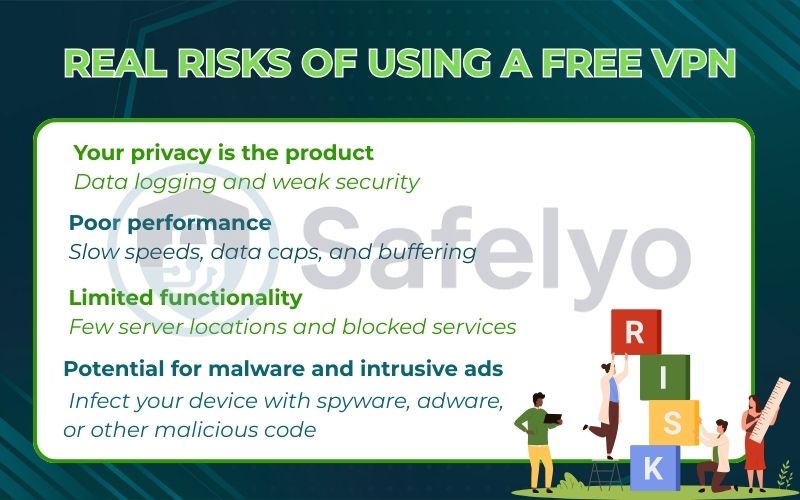
6. Is a free VPN ever a good idea?
After everything we’ve covered, this might seem like a trick question. But it’s a fair one. Is there any situation where using a free VPN isn’t a terrible idea? The answer is a heavily qualified “yes,” but only if we’re talking about a very specific type of free service.
6.1. The ‘freemium’ exception: Reputable but limited
The only free VPNs worth considering are freemium versions offered by established, reputable paid VPN providers. You can think of these as a free trial with no expiration date.
A freemium VPN is safe because it operates under the same privacy-first business model as the paid version. Companies like Proton VPN or Windscribe offer them. They don’t need to sell your data because their entire business relies on their reputation and their ability to convince you to upgrade to their paid plan.
However, they come with significant, intentional limitations:
- Speed Throttling: You’ll be on the “slow lane” servers to ensure paying customers get the best performance.
- Strict Data Caps: You might get between 2GB and 10GB of data per month. That’s enough for some light browsing, but it will run out after watching just a couple of full-length HD movies.
- Few Server Choices: You’ll typically get access to servers in only a few countries (e.g., the US, the Netherlands, Japan), locking you out of most global content.
6.2. So, when should you consider a free VPN?
Given these limitations, a reputable freemium VPN is only suitable for very specific, low-stakes, and short-term situations.
Think of it like this:
- Good for: Using the public Wi-Fi at a coffee shop just to read the news for 15 minutes. You’re not logging into anything, so the basic encryption is better than none.
- Good for: A quick, one-time task. I once used a freemium VPN to check a sports score on a geo-blocked website. It took less than a minute and required no personal information.
- Bad for: Anything else. Online banking, shopping, logging into your email or social media, streaming, or downloading files are all activities that require the security, speed, and unlimited data of a paid service.
So, is a free VPN better than no VPN at all?
A reputable freemium VPN is slightly better than no VPN on unsecured public Wi-Fi for non-sensitive tasks. However, a shady, unknown free VPN is often worse than no VPN. It gives you a false sense of security while it actively compromises your privacy.
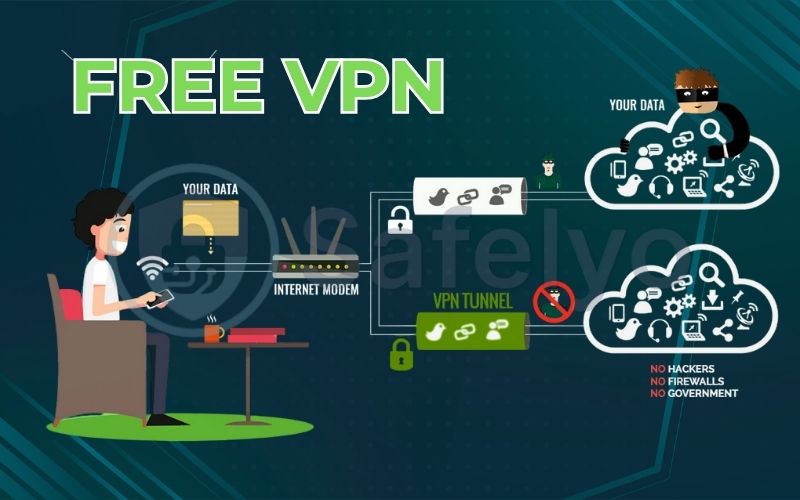
Safelyo’s advice
For anything that involves a password, a credit card number, or a personal conversation, the risks of even the best free VPN far outweigh the benefits. A low-cost paid VPN is the only sensible choice for consistent, secure, and private internet usage.
7. FAQ about free vs paid VPN comparison
We’ve covered a lot of ground in this free vs paid VPN comparison, but you might still have some specific questions. Here are clear, direct answers to the most common queries we receive at Safelyo.
In a free vs paid VPN comparison, what should I choose?
A paid VPN is the clear winner and the right choice for almost everyone. It provides guaranteed security, privacy, and performance for a small monthly fee. A free VPN, on the other hand, comes with significant risks and limitations that defeat the purpose of using one for anything beyond very brief, non-sensitive tasks.
Are free VPNs safe or worth it?
Generally, no. Most free VPNs are not safe because they lack essential security features and may log and sell your data to make money. Therefore, they are not worth the risk to your privacy. The only exception is a “freemium” version from a reputable paid provider, which is safe but extremely limited in speed, data, and features.
So, is a paid VPN worth it?
Yes, absolutely. For a small monthly fee, a paid VPN provides essential security (military-grade encryption, kill switch), guaranteed privacy (audited no-logs policies), high speeds, unlimited data, and reliable access to global content. The value it provides in protecting your digital life far outweighs its low cost.
Why would someone want to pay for a VPN if they have nothing to hide?
Paying for a VPN isn’t about hiding illegal activities; it’s about basic digital hygiene and privacy. You wouldn’t leave your front door unlocked just because you have “nothing to hide.” A VPN protects your personal information from hackers on public Wi-Fi, stops your internet provider from tracking your browsing, and prevents data brokers from building a profile on you.
Is a dangerous free VPN worse than no VPN at all?
Yes, in most cases. A dangerous free VPN is worse because it gives you a false sense of security while it actively steals and sells your data. Using no VPN on a secure home network is often safer than routing your traffic through a malicious third-party service.
Do all paid VPNs offer the same level of service?
No. While most paid VPNs are significantly better than free ones, they differ in speed, server network size, specific privacy features, customer support quality, and jurisdiction. That’s why reading expert reviews is crucial to find the one that best fits your specific needs.
What is a good, affordable paid VPN to start with?
Many top-tier VPNs offer plans that cost only a few dollars per month, especially with long-term subscriptions. As highlighted above, providers like NordVPN, Surfshark, and CyberGhost offer an excellent balance of features, security, and affordability for beginners.
8. Conclusion
After this detailed free vs paid VPN comparison, the conclusion is clear: the term ‘free VPN’ is a misnomer. You don’t pay with money, but you almost always pay with your privacy, security, and performance. The risks associated with free services are not theoretical – they are a direct result of a business model that treats you as the product.
To summarize the key takeaways:
- Free VPNs typically make money by selling your personal data, showing you ads, or severely limiting their service to push you into upgrading.
- Paid VPNs operate on a subscription model, which means their primary goal is to protect your privacy and keep you as a satisfied customer.
- The investment in a paid VPN grants you superior security, unrestricted speeds, unlimited data, and the freedom to access a truly global internet.
Don’t gamble with your digital identity. Choosing a reliable, low-cost paid VPN is one of the most effective and affordable steps you can take to secure your online life. Ready to make the smart choice? Explore the expert reviews of Safelyo in our VPN Comparisons category to find the perfect service that fits your needs and budget today.

